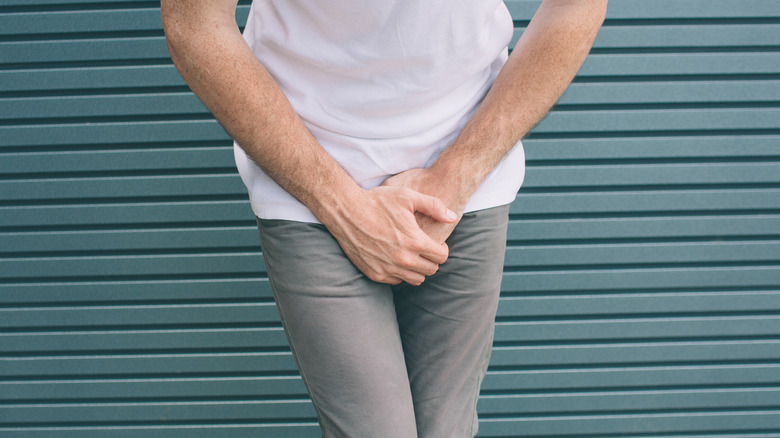When Men Age, Here's What Actually Happens To Their Pee
As we age, our bodies go through some changes. Some are outwardly noticeable, while others are not so much. We all know about wrinkles and gray hair, but there's one aspect of aging that doesn't get talked about as much: changes in urinary habits. It's something that affects most men, and it's essential to understand these changes, not just for the men themselves but also for their loved ones.
Whether you're a man curious about the mysteries of your urination habits and behaviors as you age or a family member seeking to support someone through the aging process and looking for insights, it's a good idea to explore how aging affects urination. By understanding the physiological changes that occur in the kidney, bladder, prostate, and urinary tract, you can prepare yourself for these changes, learn how you can manage them, and find out what steps you can take to maintain good urinary health.
Prostate enlargement and its impact on urinary function in Aging Men
The prostate gland, a walnut-sized gland located just below the bladder and surrounding the urethra, plays a vital role in the reproduction process. However, as men age, the prostate undergoes changes that can impact urinary function. One of the most common age-related prostate issues is benign prostatic hyperplasia (BPH), per the National Institute on Aging. It's a non-cancerous condition that causes the prostate to enlarge. According to the Cleveland Clinic, it can grow to the size of a lemon, putting pressure on the urethra and making it harder to pee.
Men who have an enlarged prostate may find themselves needing to urinate more frequently. The increased pressure on the bladder causes it to contract more often, even when it's not full. This can lead to a more urgent need to urinate, resulting in more frequent trips to the bathroom. The pressure from the enlarged prostate can sometimes partially block the urethra, causing a weakening of the urinary stream or even a split stream, making it more difficult to empty the bladder. Regular check-ups can help catch issues like BPH early on. If you do end up needing treatment, there are a variety of options available, including medication, minimally invasive procedures, and sometimes surgery.
Age-related changes in bladder function
As men age, their bladders undergo a few changes that can affect how they function. For example, a 2016 report from the Current Aging Science journal explains that they may not be able to hold as much urine as they used to, which can lead to more frequent trips to the bathroom. This can be especially noticeable at night, which is known as nocturia.
The muscles responsible for contracting and relaxing the bladder and expelling urine may also weaken over time, leading to a reduced force of the urinary stream and incomplete emptying of the bladder. Incomplete emptying can cause a sense of urgency and the need for more frequent urination. In addition, the walls of the bladder may also become less elastic with age, which can affect its ability to expand and contract efficiently, leading to a feeling of urgency and increased frequency of urination (per Medline Plus). Even a small amount of urine can sometimes trigger the urge to urinate more frequently.
Age-related kidney changes and their impact on men's urinary habits
The kidneys, the body's filtration system, undergo significant changes with time. As people age, these organs experience a reduced capacity to regulate fluid balance and filter waste efficiently. This decline results in a noticeable increase in urine production, leading to more frequent daytime urination and, on occasion, nocturnal interruptions. Aging kidneys also become less adept at conserving water, making individuals more susceptible to dehydration. The need for more frequent urination can manifest with a sense of urgency, contributing to an altered urinary experience.
Age-related changes in kidney function can raise the vulnerability to urinary tract infections (per Medline Plus). As the kidneys become less effective at filtering out bacteria and waste, the risk of infection increases. This can introduce discomfort and a frequent urge to urinate into the equation, further affecting urinary patterns.
Aging can cause many changes in urinary health, which are diverse and common. However, with the right information and proactive measures, men can manage and navigate these challenges more effectively.




